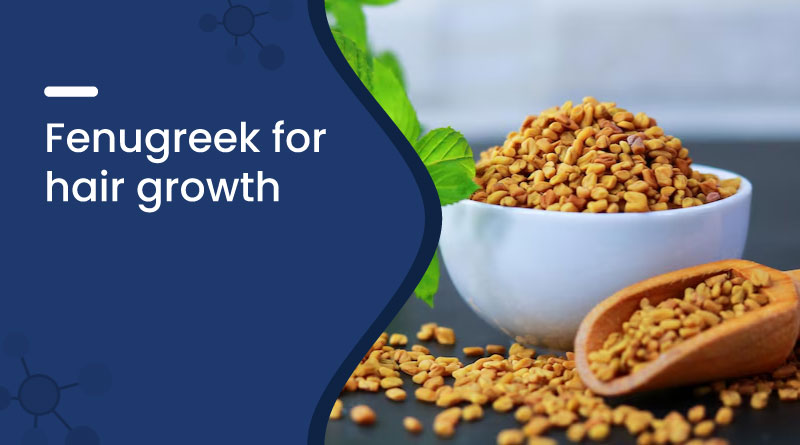Fenugreek For Hair Growth


Hair loss, slow growth, and thinning are common problems today. While there are many chemical-based products, natural remedies like fenugreek for hair growth are gaining popularity. Fenugreek seeds are packed with nutrients that can help strengthen hair, reduce breakage, and support regrowth. This blog will cover everything you need to know about using fenugreek for healthy, stronger hair.
What Is Fenugreek for Hair Growth?
Fenugreek, also known as methi, is a small golden seed widely used in Indian cooking and Ayurvedic treatments. When soaked and applied to the scalp, it releases proteins, iron, and vitamins that can improve the health of hair roots. Many people use fenugreek to fight hair fall and to naturally boost hair growth.
Why Use Fenugreek for Hair Growth?
Fenugreek seeds are rich in protein, lecithin, nicotinic acid, and iron, all of which are beneficial for hair. These nutrients nourish the scalp, repair damaged hair, and may even revive inactive hair follicles. Regular use of fenugreek may also help reduce dandruff, dryness, and scalp irritation, allowing hair to grow without interruption.
Benefits of Fenugreek for Hair
- May reduce hair fall and thinning
- Improves hair texture and shine
- Can control dandruff and scalp irritation
- Strengthens hair roots
- Supports natural hair growth cycle
This makes fenugreek a cost-effective and natural way to improve overall hair health.
How to Use Fenugreek for Hair Growth
You can apply fenugreek to your hair in different forms. Below are three easy and effective methods:
Fenugreek Paste
- Soak 2–3 tablespoons of fenugreek seeds overnight in water.
- Blend the soaked seeds into a smooth paste.
- Apply the paste on your scalp and hair roots.
- Leave it on for 30–40 minutes.
- Rinse off with a mild shampoo.
Fenugreek with Yogurt
- Mix 2 tablespoons of fenugreek seed paste with 2 tablespoons of plain yogurt.
- Apply the mixture evenly on your scalp.
- Let it sit for 30–45 minutes.
- Wash thoroughly with lukewarm water.
This method works well for dry or rough hair.
Fenugreek Oil
- Add 1 tablespoon of fenugreek seeds to 1 cup of coconut or castor oil.
- Heat the oil until the seeds turn golden.
- Let it cool, strain, and store.
- Massage into your scalp 2–3 times a week before washing your hair.
Pro Tip: For better results, be consistent and use fenugreek treatments 2–3 times per week for at least one month.
Precautions and Side Effects of Fenugreek
Though fenugreek is generally safe, keep the following in mind:
- Strong Smell: Fenugreek has a distinct odor that might linger.
- Allergic Reaction: Always do a patch test before using on your entire scalp.
- Dryness: If overused, fenugreek might make hair feel dry.
- Proper Rinse: Make sure to wash the paste off thoroughly to avoid residue.
Avoid applying fenugreek on open wounds, broken skin, or if you have scalp infections without medical advice.
Frequently Asked Questions (FAQs)
Q. What does fenugreek do for hair?
A. Fenugreek provides nutrients that strengthen hair, improve scalp health, and may support hair regrowth.
Q. How often should I use fenugreek on my hair?
A. 2 to 3 times a week is enough for most people to see results.
Q. Why is fenugreek good for hair growth?
A. It contains proteins, iron, and compounds like nicotinic acid that nourish the scalp and stimulate hair follicles.
Q. Can fenugreek remove dandruff?
A. Yes, its natural anti-inflammatory and anti-fungal properties can help reduce dandruff and itching.
Q. Is it okay to leave fenugreek paste overnight?
A. Not recommended. Leaving it too long may cause dryness or scalp irritation.
Conclusion
If you’re looking for a safe, natural, and affordable solution to hair issues, fenugreek for hair growth is worth trying. With consistent use, fenugreek can reduce hair fall, nourish your scalp, and support new hair growth. It’s simple to prepare, free from chemicals, and trusted by many for generations. Just be patient, use it correctly, and results will follow over time.
Recent Blogs
Disclaimer : Zeelab Pharmacy provides health information for knowledge only. Do not self-medicate. Always consult a qualified doctor before starting, stopping, or changing any medicine or treatment.
















 Added!
Added!